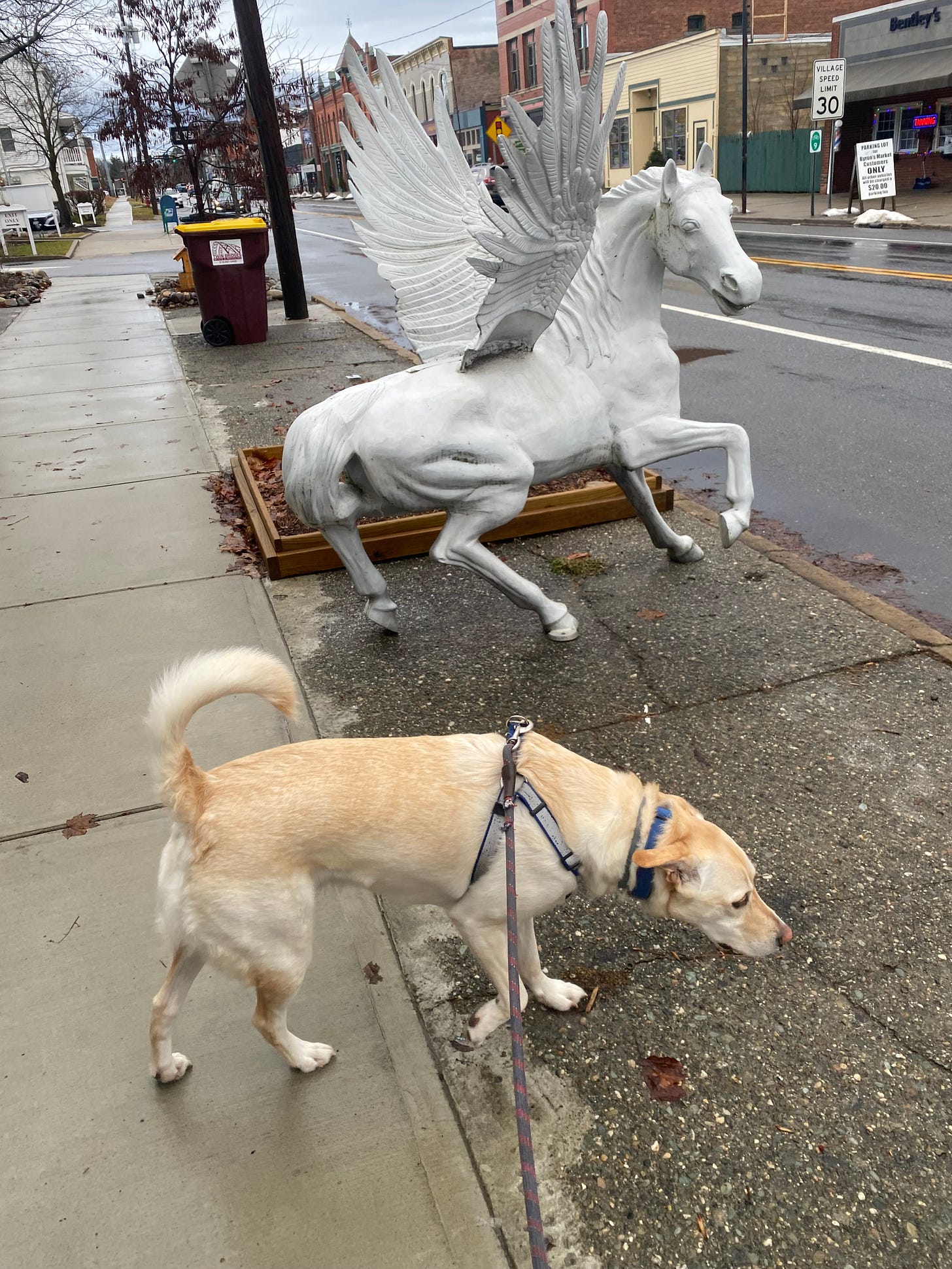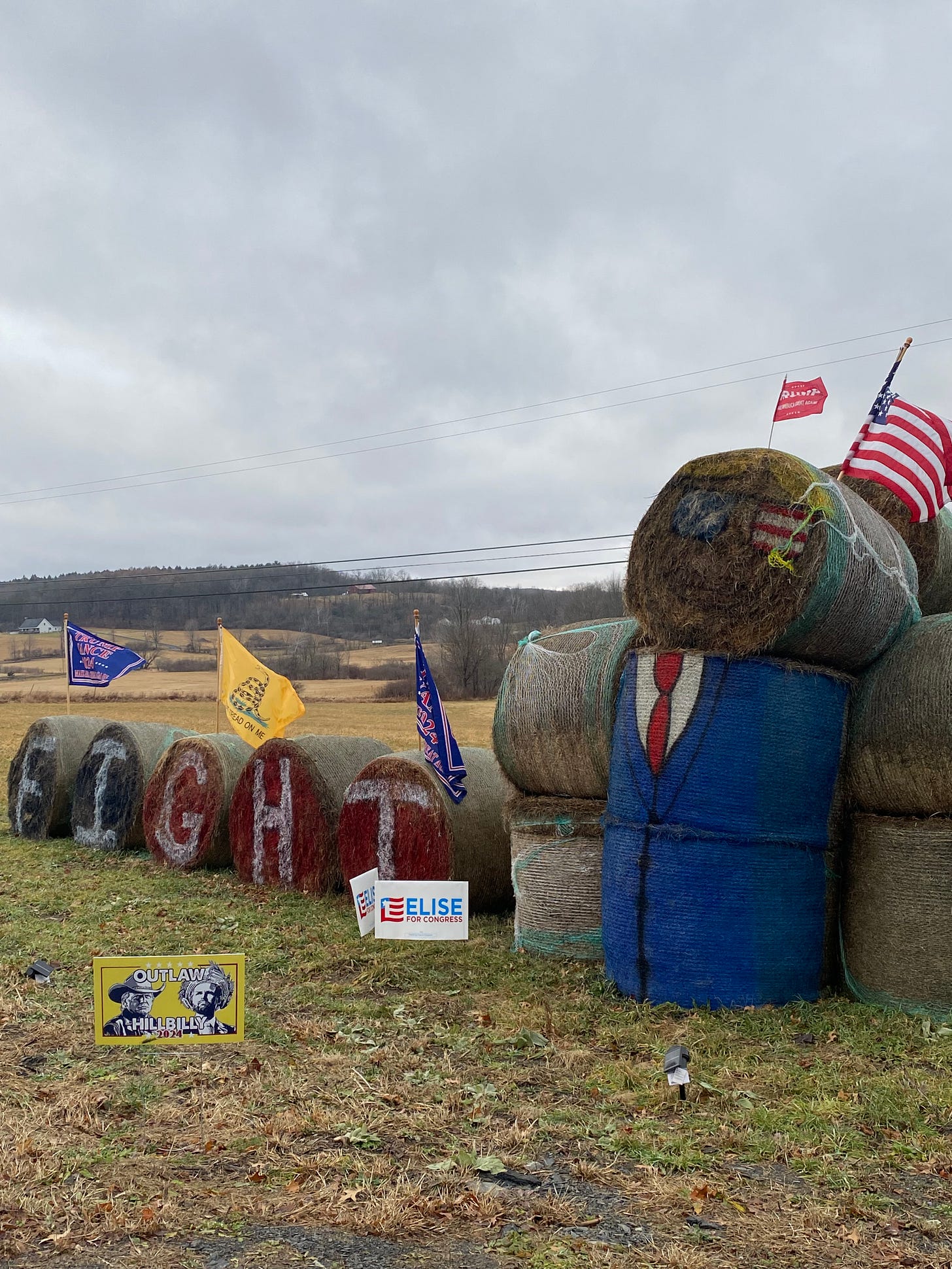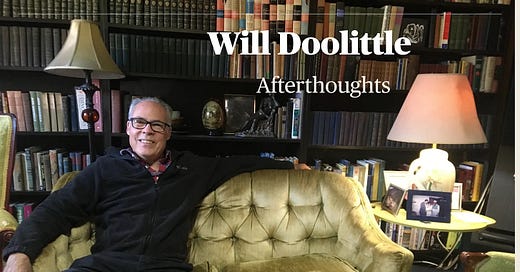Please consider supporting The Front Page with a paid subscription: HERE
Bella, my wife, was diagnosed with Alzheimer’s in 2017, but for the first couple of years, it was hard to tell anything was wrong. Little seemed to change in her personality or her activities, even when she was forced out of her job at North Country Community College because of the diagnosis, which we informed the administration of … but that’s another story.
Bella still drove, shopped, cooked, laughed and loved. She was a little more jolly, her edges less sharp. No one minded that.
She seemed fine, which made it easy not to confront the diagnosis, which, as in all Alzheimer’s cases, was a terminal one. The doctor told her she had eight years left, and when asked what we could do to help her survive, he suggested regular exercise.
No effective treatment exists, so live your life — that’s the party line on Alzheimer’s.
Ambiguous loss is a phrase used among Alzheimer’s caregivers to describe the grief we feel at the invisible, insensible taking away of everything that distinguishes the person we love.
Imagine a barrel of water in your kitchen, with a cover to prevent evaporation, from which, every day, someone secretly removes a teaspoon of water. It takes months before you notice anything happening, but in eight years, and it has now been eight years since Bella’s diagnosis, gallons have disappeared.
Live your life, they say, although the zest that makes it worth living dwindles as the years pass.
Bella doesn’t drive anymore or cook or shop. She laughs once in a while. Her face lights up when she notices someone she loves or sees a baby or a dog.
She can put one foot in front of the other after she is told which way to go. She trudges up and down the staircase.
In the gray zone we slipped into eight years ago and in which we are now immersed, we still wring some drops of joy from our time together.
I can’t grieve every day for every teaspoon of loss. Bella is here, still here, still appreciative of a kind word and a hug.
Grief is contradicted by gratefulness at what remains.
I used to mock the way folks who had just broken a leg or lost one in an accident would declare how lucky they were, but I get it now. Loss is inevitable. Surviving is lucky.
A couple of drives
We took a drive south on Monday to Schuylerville, stopping along the way at a little historical turnoff on the bank of the Hudson River, at the site of the Northumberland Dam. The dam doesn’t go all the way across the river but was built in an L-shape to create a channel of slack water. Boats could use that channel to access the Champlain Canal. The whole setup forms a dramatic panorama from the shore.

After stopping at the Northumberland Dam site, we continued to Schuylerville and strolled down the main street for a couple of blocks.

Then on Wednesday, we drove west into the Washington County countryside, with its beautiful fields and hills.

Poe
I’ve been reading Vol. 1 — “Tales” — of “The Works of Edgar Allan Poe,” which includes some fascinating biographical pieces, including a preface by Maria Clemm, Poe’s aunt and his mother-in-law (Poe married his first cousin); a review of Poe’s work and his place in literature, written during Poe’s lifetime by James Russell Lowell; reflections on Poe’s character by N.P. Willis; and a 70-page “Memoir of the Author,” by Rufus Griswold, who was Poe’s literary executor. These people knew Poe personally, and the portrait of him that emerges from their reflections — the gifted, spoiled, charming, arrogant, unpredictable, astonishing, alcoholic, tortured, soft-spoken, eloquent and cynical man who, surprisingly, made it to 40 before succumbing to the consequences of his bad habits — is as fascinating and vivid a literary character as I’ve ever encountered.
What struck me as the most outrageous and entertaining part of Poe’s character was his absolute absence of integrity in his literary criticism. He would mock a fellow author in the most caustic terms — wishing that one, for example, would succeed in his intention “to blow out what he supposed to be his brains” — then, soon afterward, praise his work, saying of the same author’s book, “I do not think, indeed, that a better book of its kind has been written in America.” He was carried away by his personal feelings of the moment and had no concern for consistency.
I also read a couple of the tales in the book — “Adventure of One Hans Pfall,” a story that purports to be about a man flying a hot air balloon to the moon (but, at the end, reveals itself as a hoax); and “The Gold Bug,” a story of buried treasure that includes a fascinating, very detailed section on cryptography, in which Poe was something of an expert. In “Hans Pfall,” too, Poe goes into great detail about the technical aspects of Pfall’s balloon and how it was rigged to safely carry a man through space. I’m certain the balloon wouldn’t work, and anyone flying a balloon toward the moon would die before he got there, but it is fascinating to read how Poe thought about the scientific obstacles to the task and came up with elaborate techniques to overcome them.
Poe’s writing marries this very precise, rational inclination to a vivid and unbounded imagination in a way that overcame my skepticism and left me free to enjoy the wonders of his storytelling.
Apparently, Poe was equally mesmerizing in person. Here is a passage about him from the biography by Griswold:
“His conversation was at times almost supra-mortal in its eloquence. His voice was modulated with astonishing skill, and his large and variably expressive eyes looked repose or shot fiery tumult into theirs who listened, while his own face glowed, or was changeless in pallor, as his imagination quickened his blood or drew it back frozen to his heart.”
More on Tolls
A couple of weeks ago, I told about receiving a bill from Tolls by Mail, which collects for various entities such as the New York State Thruway Authority when drivers without E-Z Pass transponders use the state’s toll roads. The bill wasn’t for me — the toll was registered near Buffalo on a date I was nowhere near the place and for a license plate that isn’t mine. But to prove the bill was mistaken, I had to pay $10 for a NY vehicle registration abstract, proving that the car wasn’t mine. Since the toll, plus admin. fee, was $5.43, I had to pay more to get out of the toll then I would have if I just paid it.
This past week, I called Tolls by Mail to make sure they had received my paperwork, which I had.
“They transferred the charge to your E-Z Pass account,” the clerk explained.
“But I don’t owe the charge. The whole point was that the bill was a mistake,” I said.
“Hold on while I talk to my supervisors,” she said.
I had called because I didn’t trust that my correspondence would be handled correctly and feared that, in a month or two, I would receive a notice that my license was being suspended for failure to pay. This conversation was not increasing my confidence.
Finally, the clerk came back and said I was correct, the E-Z Pass charge would be withdrawn and I would receive a confirmation in a couple of weeks that I did not owe the original toll.
I can’t say I’m reassured.







The unpredictability of this degenerative disease poses unimaginable challenges, and demands creative on-the-spot interventions. No two cases are alike…but “estimates” of life expectancies may be helpful for financial and home healthcare assistance planning.
Your capacity for being-in-the-moment with Bella makes all the difference, Will. And tapping into your reservoir of writing skills, which continue to educate us all with your gut-deep honesty and insight - not found in books or medical school classrooms - has value beyond measure. And the daily outings which connect you, Bella and Ringo to nature/human contacts are essential ingredients for lessening the isolation that accumulates in the toll on caretakers.
The quote “Yesterday is history…Tomorrow is a mystery…all we have is today…that’s why we call it The Present” is a mantra we could all adopt from your chronicles of your life with and love of Bella. Thank you, Will.
I look forward to your weekend columns! They are like letters from a friend — moving, amusing, informative, inspiring and warm. Thank you!